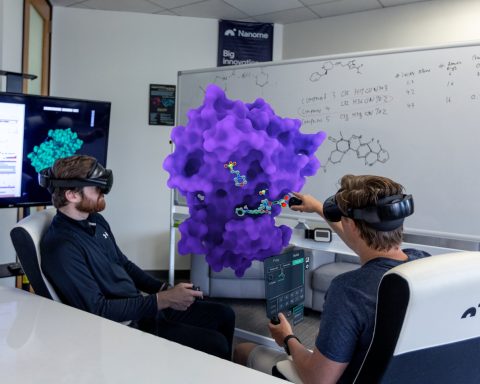Researchers are attempting to revolutionize the treatment of diseases of the pancreas. In collaboration with the University Hospitals in Münster and Bochum, Germany the biotech company CILIAN AG located in Münster, Germany is developing a medicine that provides patients with essential digestive enzymes. The new approach is much safer and cleaner compared to current standard.
Microorganisms are aiding the researchers in this endeavor: Single cell protozoa get programmed to express the desired enzymes. The project is being supported through a significant grant from the German Ministry of Education and Research.
[wp_ad_camp_4]Treatment of patients with so-called “exocrine pancreatic insufficiency” is one application for the new medical product. This common disorder is characterized by an inflamed pancreas and a significantly decreased production of digestive enzymes. Hence, the body is not capable any more to digest fat and protein based food. Diarrhea, weight loss and severe malnutrition are the consequence.
Patients with other disorders, such as chronic pancreatitis, cystic fibrosis or pancreatic cancer can also be treated with this medicine brand named Cilase®.
Pancreas-Expert: “We urgently need an alternative”.
“In our own clinic alone we see numerous patients that need exactly such a medicine” explains Professor Dr. Waldemar Uhl. He is head of the University Pancreas Center at Sankt Josef-Hospital Bochum, Germany. The scientist, who since about 30 years treats diseases of the pancreas, underscores the relevance of this product for daily clinical practice. For this reason, Uhl agreed to assist CILIAN in the development of this new medicine, Cilase®. “Regulatory authorities take a very critical stance towards today’s standard medicine. We urgently need an alternative! The solution developed by CILIAN is therefore just right”, according to Uhl.
Ciliates help with digestion
Through this innovative approach, a team of researchers at CILIAN produce the digestive enzymes using ciliates, single cell protozoa of the species Tetrahymena.
“These ciliates are ideal, since they can easily be handled in the laboratory, they multiply at blazing speed and are also very similar to human cells in many aspects” explains Dr. Marcus Hartmann, scientific head at CILIAN. His team programs the DNA of these small organisms in a sophisticated biotechnical process to produce the enzymes that can then be harvested. Hartmann ads: “Enzymes produced by Tetrahymena can be absolutely clean and free of unwanted agents. A better approach does not exist.”
Unsafe: Digestive Enzymes from the Slaughter House
For Pankreatin, the current standard medicine, the enzymes are harvested from swine pancreas. For this, pharmaceutical companies use waste collected in slaughter houses.
This method is being criticized for ethical reasons and the use of products of porcine origin is prohibited to a large extent in Islamic society. More important yet, medicines from slaughter waste pose big safety risks: The method can hardly be standardized and often times it cannot be determined under what conditions animals were held.
“Risk of infections is simply higher” explains Uhl. “I would not be surprised to see authorities restricting or prohibiting use of Pankreatin.”
“The regulators’ skepticism towards Pankreatin is more than appropriate. Bad news from the meat industry are not new, thinking just of spoiled meat scandals or swine flu. Dangerous agents such as antibiotics or pathogens are old news anymore” according to Hartmann, “Our approach is ethically non-controversial and constitutes a significant improvement of the production process – for the benefit of safety for all patients”.
University Hospital in Münster performs the tests, Government supports
In order to realize Hartmann’s vision, CILIAN was able to attract important partners besides the University Hospital in Bochum: The German government supports the project with a significant grant in a million amount; and the University Hospital in Münster will perform the tests for the developed enzymes under different conditions.
“Human digestion takes place under very different, partly extreme conditions” explains Dr. Jürgen Schnekenburger, head of the Biomedical Center at the University Hospital in Münster, Germany. “We are dealing with stomach and pancreas fluids of very different acidity. Our task is to verify how the enzymes developed by CILIAN work under such conditions.”
To accomplish this, Schnekenburger and his team are preparing a variety of human stomach fluid samples. Tetrahymena enzymes will be introduced to those samples and the results analyzed. The scientist is confident: “Considering results to date I am certain that we will identify enzymes that will meet requirements.”
Good candidates for lipase found already
Fluid samples used by Schnekenburger are all fully human and supplied from the University Hospital in Bochum. During major procedures, Uhl’s team of surgeons collect small samples of stomach and pancreas fluids from patients with pancreatic disease. This is a totally safe medical procedure. The collected samples will then be transferred to Münster.
“We already collected and sent samples from 80 patients to Münster” says Uhl. The pancreas expert from Bochum is also convinced of the success of Cilase®: “The entire project is progressing very well. We have already found very good candidates for lipase – meaning for digestion of fat.”
First in vivo tests successful
Next steps are already being planned at CILIAN, where the collaboration is being coordinated. Following successful first in vivo testing with Cilase®, more testing is already scheduled in animals at the University of Münster.”
“Demand for a product such as Cilase® is extremely high” remarks CILIAN’s CEO, Christian Scheiner. “We strive to satisfy patients demand and will therefore complete the product’s development as expeditiously as possible.”








